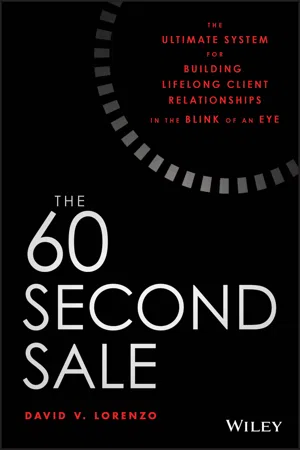
The 60 Second Sale
The Ultimate System for Building Lifelong Client Relationships in the Blink of an Eye
- English
- ePUB (mobile friendly)
- Available on iOS & Android
The 60 Second Sale
The Ultimate System for Building Lifelong Client Relationships in the Blink of an Eye
About this book
Every sale is made or lost in 60 seconds—make them count
Cold calling and pushing your way into an office or a living room creates an atmosphere of adversity and distrust you must overcome before you close the deal. With those tired tactics, you're swimming upstream, against a strong current, with a bag of rocks tied to your waist.
Sales has changed.
Legacy sales gimmicks destroy relationships right from the first minute.
The 60 Second Sale is a turnkey system for building profitable, lifelong relationships. Whether you work with affluent consumers or sell to senior executives in FORTUNE 500 companies, this step-by-step guide will help you open doors, close deals, and make more money in a way that leverages your natural strengths. That's the magnificence of the 60 second sale system. You get to be yourself and build your business.
In this book you will discover:
- How to start a sales conversation in 60 seconds
- Who to target for immediate income
- A powerful yet easy-to-use system to generate relationship revenue
- Five ways to initiate new relationships
- What to say to make sure your business meetings result in money in the bank
- The secret to getting a "yes" every time, even in the most competitive sales environment
- The winning mindset that removes the stress, uncertainty, and fear from income generation
- And so many other effective business growth strategies, your competition won't know what hit them
Business relationships are built one minute at a time. From introduction to closing, every 60 seconds you have an opportunity to strengthen your relationship or destroy it. Isn't it time you started leveraging your expertise, demonstrating your value, and building trust with your clients? When you do, they buy into who you are and how you can help them – right from the first minute.
The 60 Second Sale is a fail-proof system for succeeding in today's relationship-focused sales environment.
Frequently asked questions
- Essential is ideal for learners and professionals who enjoy exploring a wide range of subjects. Access the Essential Library with 800,000+ trusted titles and best-sellers across business, personal growth, and the humanities. Includes unlimited reading time and Standard Read Aloud voice.
- Complete: Perfect for advanced learners and researchers needing full, unrestricted access. Unlock 1.4M+ books across hundreds of subjects, including academic and specialized titles. The Complete Plan also includes advanced features like Premium Read Aloud and Research Assistant.
Please note we cannot support devices running on iOS 13 and Android 7 or earlier. Learn more about using the app.
Information
Chapter 1
It Was Never about the Pen
60 Second Summary
What's in This Chapter for You?
The Dumbest Sales Interview Question in History
Office Supplies by Referral Only
External Orientation: Relationships, Not Transactions
- For every conversation, 70% should be focused on the other person. Stop talking. People do not care about you until they believe you have their best interests in mind. This means you have to shut up and let them do the talking.
- When people talk to you, they tell you their problems and their goals. People want help but they don't want to ask for help. Sometimes they are too embarrassed to ask. Sometimes their pride gets in the way of asking. But if you allow people to open up, they will tell you what they truly desire. That will give you the opportunity to help.
- When you solve problems, you make money. Most sales professionals look for problems their product can solve. When that particular problem hits them in the face, they are great at matching the benefits of their product...
Table of contents
- Cover
- Table of Contents
- How to Use This Book
- Introduction: Who Is This Guy? Why Should I Read This Book?
- Chapter 1: It Was Never about the Pen
- Chapter 2: The First 60 Seconds Sets the Tone for a Lifetime
- Chapter 3: The RaporMax® System
- Chapter 4: Get MAD, Get Clients, Get Money
- Chapter 5: Forget the Frat Boy Approach – Convert with a Honeypot
- Chapter 6: Put Your Mouth Where the Money Is
- Chapter 7: Premier Positioning through Publishing
- Chapter 8: A Place for Your Stuff: Primary Internet Presence
- Chapter 9: Anti‐Social Media
- Chapter 10: ACTION Speaks Louder Than Words
- Chapter 11: How to Be Great at Networking Even If You Hate People
- Chapter 12: Qualified Prospects Become Quality Clients
- Chapter 13: Open a Door and Close the Deal
- Chapter 14: The End of the Beginning
- Parting Shots: Seven Mistakes Sales Leaders Make
- Glossary
- Acknowledgments
- About the Author
- Index
- End User License Agreement